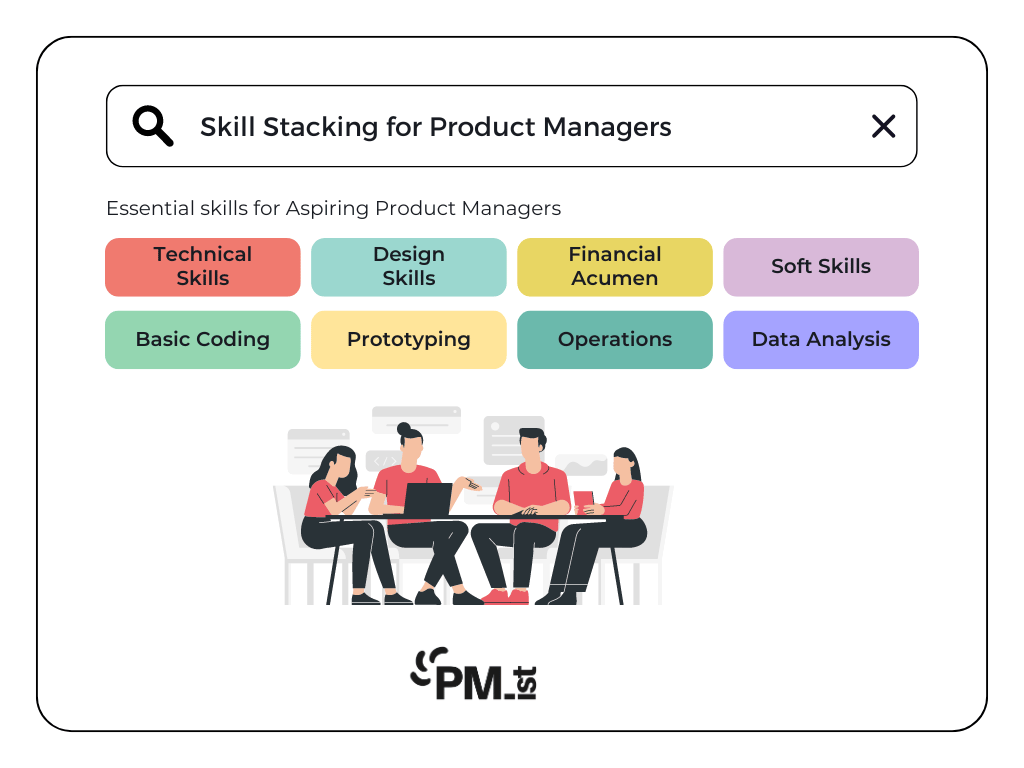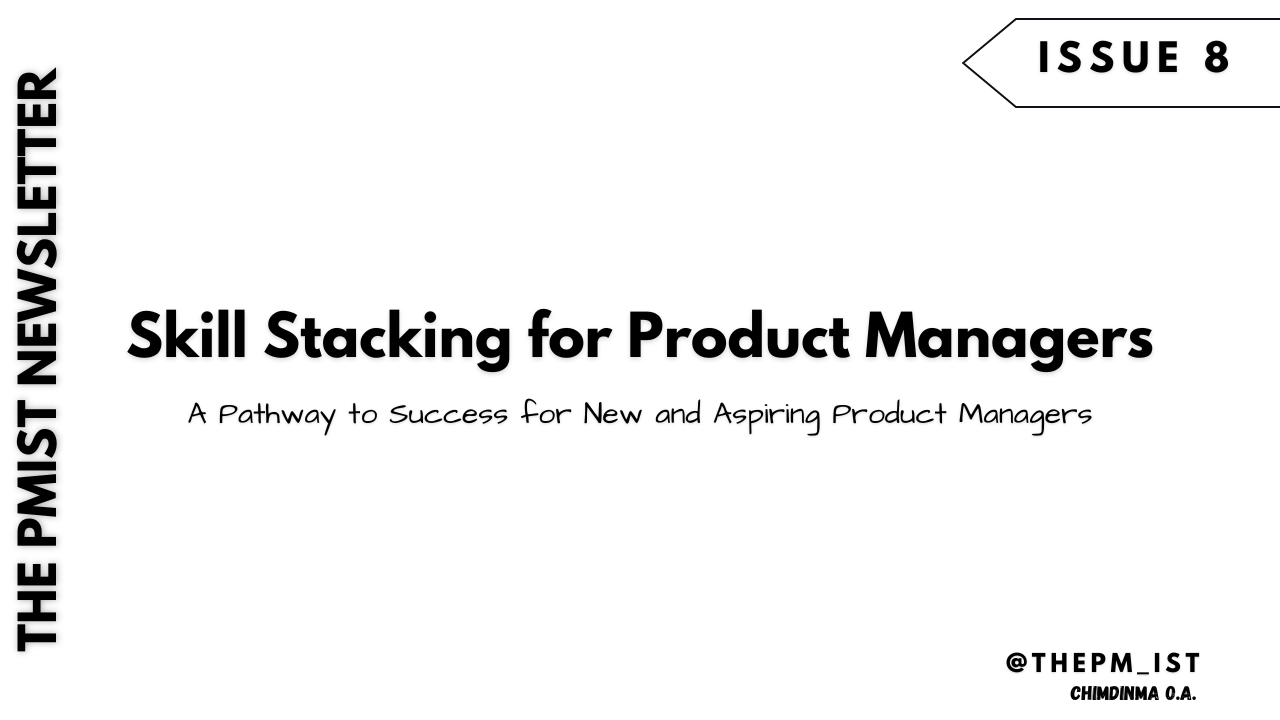Picture this: you've just landed your dream job as a product manager. You've mastered all the essential skills—roadmaps, user stories, market analysis—you name it, you've nailed it. One day, you’re in the office, doing your job, feeling like you've got it all under control. But then, your manager casually mentions, "Oh, by the way, we need you to pull some data insights using Power BI and while at it, we also need you to build automated reports, and integrate it with our existing systems." Cue the record scratch. Power BI? You've never used it before!
Now, if you're lucky, your company might step in with some quick training to get you up to speed. But this moment is a prime example of how the surprises never stop when you're a product manager and a professional as a whole. Sure, you've got your core skills down, but there's always more to learn, more tools to master, and more ways to make yourself the star player on the team.
Welcome to the world of skill stacking; the more you know, the further you go!!!

Becoming a successful product manager (PM) in today’s fast-paced, competitive world can seem daunting for those just starting out. The role requires a broad range of responsibilities, from market research and user experience design to project management and stakeholder communication. Product managers must master the art of wearing many hats, but how can one truly stand out in such a multifaceted field? This is where skill stacking comes into play, a powerful strategy that involves combining multiple complementary skills to enhance your overall effectiveness and value.
In this article, we’ll explore the concept of skill stacking, why it’s crucial for product managers, and how you can cultivate a diverse set of abilities to distinguish yourself in the field. We'll explore how you can keep leveling up as a product manager, adding new skills that not only make you versatile but also invaluable.
Understanding Skill Stacking
Skill stacking is the practice of acquiring and integrating a variety of skills that, when combined, make you uniquely capable in your profession. Rather than striving to be the absolute best in a single area, the focus shifts to becoming proficient across several disciplines. When these skills work together, they give you a competitive edge that sets you apart from specialists who may excel in one domain but lack a broader perspective. In product management, where the role is inherently interdisciplinary, this approach is advantageous and essential.
Scott Adams, the creator of the Dilbert comic strip, famously said, "Every skill you acquire doubles your odds of success." This philosophy resonates deeply in product management, where success often hinges on your ability to fuse skills in technology, business, design, and leadership. A product manager who can connect the dots between data analytics, user experience, and market trends becomes more than just a facilitator—they become a strategic leader capable of driving meaningful innovation.
Why Skill Stacking Is Crucial for Product Managers
The role of a product manager often involves seeing the whole picture and orchestrating various elements to create successful products. Skill stacking is crucial because it enables PMs to approach problems with a more holistic mindset. Here’s why it matters:
Holistic Understanding of the Product Lifecycle: To guide a product from concept to launch and beyond, PMs must understand every stage of the product lifecycle. Stacking skills in areas like UX design, data analysis, and marketing equips you to make informed decisions that align with both user needs and business goals. When you understand design principles as well as market dynamics, you can craft products that not only look good but also solve real problems for your users.
Enhanced Communication and Leadership: Product managers are often the bridge between cross-functional teams—engineers, designers, marketers, and executives. Effective communication and leadership are non-negotiable. By stacking skills in negotiation, conflict resolution, and storytelling, you become adept at managing diverse stakeholders and ensuring everyone is aligned with the product vision. For example, a PM who can translate complex technical details into clear, actionable insights for executives is invaluable in driving decisions that keep projects on track.
Improved Problem-Solving and Adaptability: The challenges product managers face are often complex and multifaceted. Skill stacking in critical thinking, coding, and project management enables you to anticipate potential obstacles, devise creative solutions, and implement them efficiently. The tech landscape evolves rapidly, and adaptability is key. By continuously learning new tools and methodologies, PMs can stay ahead of the curve, pivoting quickly in response to changing markets or customer demands.
Building Trust and Driving Innovation: At the heart of successful product management is trust—trust from your team, stakeholders, and customers. By stacking skills in data analytics, customer psychology, and financial analysis, you gain the ability to build data-driven strategies that inspire confidence. Moreover, a diverse skill stack allows you to foster innovation by drawing connections between seemingly unrelated disciplines. This ability to cross-pollinate ideas from different domains is what sets great PMs apart from good ones.

Essential Skills for Aspiring Product Managers
To build a well-rounded skill stack, focus on acquiring abilities across the following core areas:
Technical Skills:
Basic Coding: Understanding programming languages like Python or JavaScript helps you communicate effectively with developers and grasp technical constraints that impact product decisions.
Data Analysis: Proficiency in tools like SQL, Excel, or Tableau enables you to make data-driven decisions, identifying trends and measuring the impact of product changes.
Design Skills:
UX/UI Design: Knowledge of design principles and tools like Sketch or Figma is essential for creating intuitive, user-friendly products. A deep understanding of user experience helps ensure that your product resonates with your target audience.
Prototyping: Mastering prototyping tools allows you to quickly iterate on ideas, test concepts, and validate solutions with users before full-scale development begins.
Business Acumen:
Market Research: Strong market research skills ensure that your product meets real customer needs and stays competitive in the marketplace. Knowing your audience and competitors inside and out helps you make strategic decisions.
Financial Literacy: Understanding budgeting, forecasting, and financial analysis is crucial for managing a product’s profitability and ensuring it delivers value to the business.
Soft Skills:
Communication: Clear, concise, and effective communication is at the core of product management. Whether you’re presenting a roadmap to executives or leading a team meeting, strong communication skills are essential for aligning all parties.
Leadership: Leading cross-functional teams requires empathy, vision, and decisiveness. Strong leadership skills help guide your team through challenges and keep everyone focused on the common goal.
Time Management: The ability to prioritize tasks, delegate responsibilities, and keep projects on schedule is vital to ensuring successful product delivery.
How to Build Your Skill Stack
Building a robust skill stack requires a commitment to continuous learning and hands-on experience. Here’s how you can start:
Continuous Learning:
Courses and Certifications: Online platforms like Coursera, Udemy, and LinkedIn Learning offer a wide range of courses on technical skills, design, business strategy, and leadership. Certifications such as Certified Scrum Product Owner (CSPO) or Google’s Project Management Certificate can enhance your credibility and expand your knowledge base.
Books and Blogs: Reading industry-leading books like Inspired by Marty Cagan or following blogs like Mind the Product keeps you updated with the latest trends, tools, and strategies in product management.
Hands-On Experience:
Side Projects: Working on personal or side projects allows you to apply new skills in real-world contexts, helping you build confidence and competency. Whether you’re designing a mobile app or managing a small team, these experiences are invaluable.
Volunteer Work: Offering your skills to startups or non-profits provides practical experience while contributing to meaningful causes. It’s a win-win: you sharpen your skills while building your portfolio.
Networking and Mentorship:
Professional Networks: Joining communities like Product School or attending industry conferences connects you with peers and leaders who can offer valuable insights and guidance. These networks can open doors to mentorship and collaboration opportunities.
Mentorship: Finding a mentor. Someone who has walked the path you’re on and can accelerate your learning curve and provide tailored advice that’s crucial for your growth as a PM.
Quotes to Inspire Your Journey
Ben Horowitz, Co-founder of Andreessen Horowitz, emphasizes the power of diverse experiences: “Hire for strength, not lack of weakness.” This resonates with the philosophy of skill stacking—it's about building strength across multiple areas rather than focusing on avoiding gaps.
Steve Jobs once said: “Innovation is the ability to see change as an opportunity – not a threat.” Embracing skill stacking allows you to see each new skill as an opportunity to innovate, adapt, and grow.
Skill stacking is a powerful strategy for new and aspiring product managers looking to excel in their careers. By cultivating a diverse set of complementary skills across technology, design, business, and leadership, you can enhance your ability to manage products effectively, communicate with stakeholders, and drive innovation. The journey to becoming a successful product manager involves integrating many skills and expertise to create something grand. Through continuous learning, practical experience, and the power of networking, you can build a skill stack that sets you apart as a product manager.


